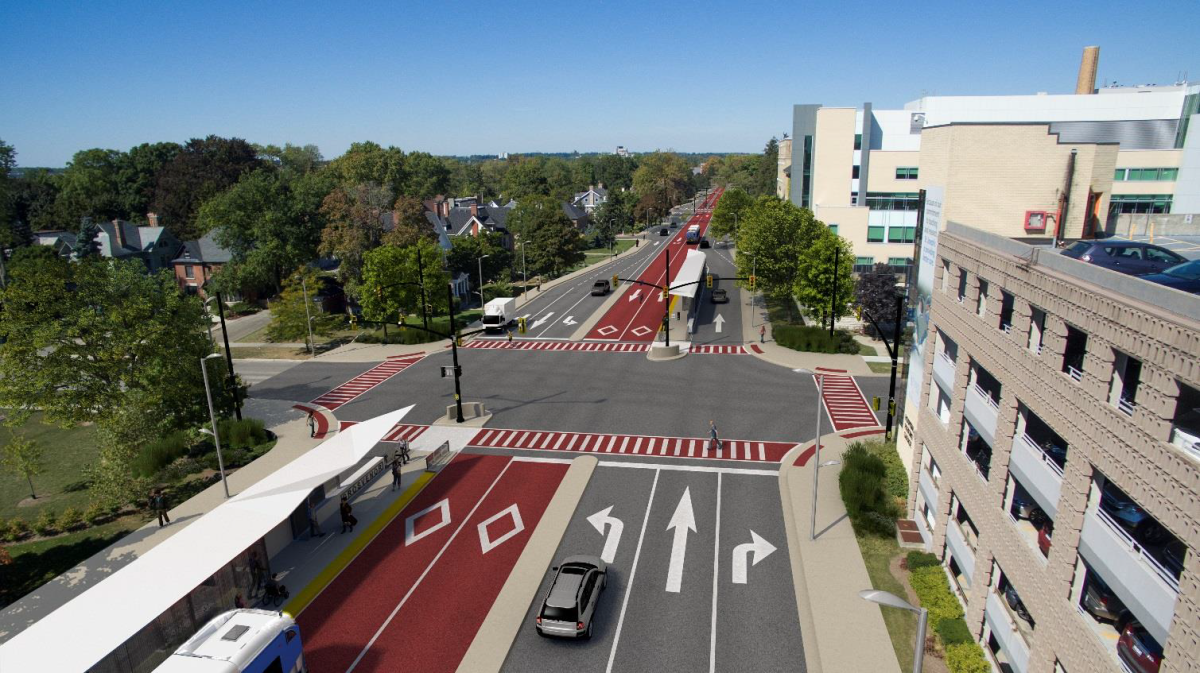Londoners hoping to get a sneak peek of bus rapid transit in 2019 are out of luck.

The city’s rapid transit implementation group heard on Thursday plans for a “quick start” to BRT next year to give Londoners a taste of what rapid transit will look like when its fully operational have been scrapped.
“The more we investigated the options we found they didn’t hold up from a construction feasibility or cost benefit perspective,” said BRT project director Jennie Ramsay. “As we examined the options it became clear these early elements of BRT would result in throwaway costs and unnecessary construction without really benefitting Londoners.”
The quick start plan, which would have cost just under $22 million, would have built some preliminary BRT elements along Richmond in 2019 including a prototype stop and cue jump lanes.
The prototype stop would have been located at King and Wellington but that would have impacted underground utilities and would lead to construction on Wellington Road and possibly intersections at King and Dundas. Road work is planned for those locations in 2020 and 2021 meaning the quick start plan would have created double the construction.
The earliest Londoners will now see the fruits of BRT is in 2020, assuming the transit plans aren’t dramatically altered by the city’s new city council.
- ‘Shock and disbelief’ after Manitoba school trustee’s Indigenous comments
- Invasive strep: ‘Don’t wait’ to seek care, N.S. woman warns on long road to recovery
- ‘Super lice’ are becoming more resistant to chemical shampoos. What to use instead
- Canadian food banks are on the brink: ‘This is not a sustainable situation’
Speaking on The Craig Needles Show on Friday, Deputy Mayor Paul Hubert says scrapping the quick start plan was a prudent decision.
“Our engineering staff is very circumspect. They’re very aware these are public dollars they’re managing and they want London to get the best bang for the buck,” he said. “Tearing up a street twice is never a good plan.”
London’s $500 million bus rapid transit project was a key issue in the 2018 municipal election. Many, including incoming mayor Ed Holder, were critical of the current plan during the campaign.
London has committed $130 million towards the project with the provincial government committing $170 million. The federal government has set aside $200 million for transit in the city, however that money is not specifically for BRT.
City staff is currently reviewing 48 heritage properties that are in conflict with the 24-kilometre route. That review isn’t expected to be complete until next March. City hall has yet to receive permission from Western University to run rapid transit buses on Western’s campus.
Ramsay told the committee negotiations with the university continue but a final agreement hasn’t been reached. Western officials tell 980 CFPL a possible campus route has been identified but no agreement has been reached.
The committee also heard how the LTC plans to extend service to some industrial areas where buses currently don’t travel.
LTC General Manager Kelly Paleczny says they have plans to work with third party entities such as Uber and taxi cabs to transport people from a bus stop to their final destination.
“Essentially people would get off the bus at Argyle Mall or Fanshawe College and transfer into a third party vehicle that would take them to their place of employment,” said Paleczny.
“Same thing on the way home, we would pick them up at their place of employment and take them to that closest transit terminal and they would finish their trip.”
Paleczny says there are multiple areas in the city where they are considering utilizing that partnership.
Unlike the quick start plan, the partnership between the LTC and those third party entities is expected to begin in 2019.








Comments